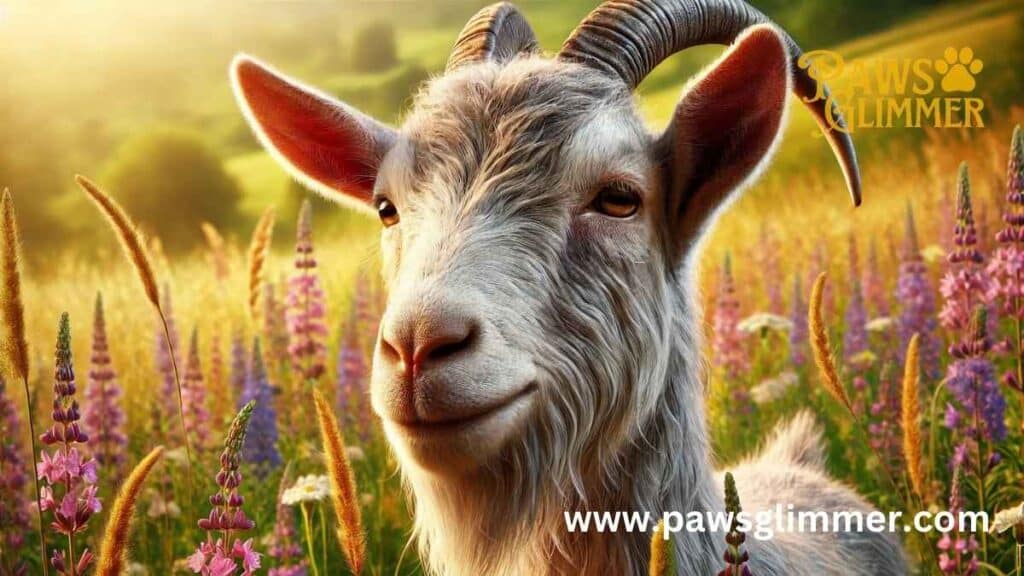Can Goats Eat Apples? Yes, goats can eat apples, and they can benefit from the nutritional value these fruits provide. Apples are packed with essential vitamins, fiber, and antioxidants, which support goat health and help improve their digestion. However, moderation is key when feeding apples to goats. If given too much, the high sugar content can lead to digestive issues, such as bloating. To avoid these risks, it’s essential to offer apples as an occasional treat rather than a regular part of their goat diet.
When feeding apples, always remove apple seeds to prevent the risk of cyanide poisoning. Amygdalin found in apple seeds can release cyanide when ingested, which is harmful to goats. Slicing apples into smaller pieces is also crucial to avoid choking hazards, especially for baby goats or smaller animals. By offering apples in moderation and ensuring they’re properly prepared, you can make this fruit treat a healthy addition to your goat’s diet while maintaining their overall well-being.
Can Goats Eat Apples As a Treat?
Goats can absolutely enjoy apples as treats. These sweet fruits make excellent nutritional treats when offered in moderation. The key is treating apples as exactly that – treats, not a main food source. A medium-sized apple divided among several goats provides a perfect serving size.
Smart feeding guidelines suggest offering apple treats 2-3 times per week maximum. This approach helps maintain proper dietary balance while letting your goats enjoy this tasty snack. Remember that treats should only make up about 10% of their daily food intake.
Do Goats Love Apple?

Most goats show genuine excitement when offered apples, which isn’t surprising given their naturally curious nature and love for sweet flavors. Their enthusiasm for these fruit treats often shows through their eager nibbling and positive response to apple-feeding time.
These intelligent animals quickly learn to recognize the sight and smell of apples, often approaching their owners with enthusiasm when they spot this favorite treat. This natural attraction makes apples an excellent choice for training or bonding with your goats.
Can Goats Eat Apple Seeds?
The topic of apple seeds requires special attention due to their cyanide content. While a few seeds won’t harm your goat, it’s best to remove them as a safety precaution. Seeds contain amygdalin, which converts to cyanide when digested, though goats would need to eat large quantities to experience serious effects.
For safer feeding practices, take a moment to core apples before offering them to your goats. This simple step eliminates any risk of cyanide poisoning and makes the treat completely safe. Think of it as taking the same precaution you would for a child.
Can Baby Goats Eat Apples?

Baby goats, or kids, should not eat apples until they’re at least 3-4 months old. Their developing digestive system needs time to mature, and they should focus on mother’s milk and appropriate starter feeds during their early months.
Here’s a simple age-based guide for introducing apples:
| 0-3 months | No apples |
| 3-6 months | Tiny pieces (thumbnail size) |
| 6-12 months | Quarter apple maximum |
| Adult | Half apple maximum |
Can Goats Eat Apple Cores?
While goats can technically eat apple cores, it’s safer to avoid feeding them. The tough, fibrous center poses a potential choking hazard, especially for eager eaters. The core’s woody texture also makes it harder to digest than the flesh.
Can Goats Eat Apple Peels?
Apple peels are perfectly safe and nutritious for goats. In fact, the peel contains higher concentrations of antioxidants and fiber than the flesh. Just ensure the apples are thoroughly washed to remove any pesticides or contaminants before feeding.
The Most Energetic Animals in the World
Why You Should Not Feed Too Many Apples to Goats?
Overfeeding apples can lead to serious digestive issues and health problems. The high sugar content can disrupt the delicate balance of their rumen, the first chamber of their complex digestive system. Too many apples may cause bloating, diarrhea, and other gastrointestinal disturbances.
Excessive apple consumption might also lead to:
- Decreased hay consumption
- Dental problems from too much sugar
- Unhealthy weight gain
- Rumen acidosis
Can Apples Substitute Regular Diet?
Apples should never replace a goat’s regular balanced diet. While nutritious, they lack the essential nutrients found in hay, grass, and proper goat feed. A goat’s primary diet should consist of quality forage and appropriate supplements for optimal health.
The following table shows why apples can’t replace main feed:
| Nutrient Type | Regular Feed | Apples Only |
|---|---|---|
| Protein | High | Low |
| Fiber | Optimal | Limited |
| Minerals | Balanced | Insufficient |
| Calories | Appropriate | Too high in sugar |
An Apple For You, An Apple For The Goats

When sharing apples with your goats, choose fresh, firm fruits without signs of rot or mold. Organic apples are ideal, but conventional apples are fine if properly washed. Different apple varieties offer varying levels of sweetness and texture, but all are equally suitable as goat treats.
Consider these popular apple varieties for goats:
- Honeycrisp: Easy to chew
- Gala: Naturally sweet
- Fuji: Firm texture
- Red Delicious: Softer flesh
Apples and Your Goats Digestive System
Goats are ruminant animals with a complex four-chambered stomach system. Their digestive process involves fermenting food in the rumen before further digestion. Apples, being high in natural sugars, can affect this delicate system if fed in excess.
Understanding the fermentation process helps explain why moderation is crucial. The natural sugars in apples ferment quickly in the rumen, potentially causing rapid gas buildup and bloating if too many are consumed at once.
Nutritional Value
Apples provide several beneficial nutrients for goats:
| Nutrient | Benefit |
|---|---|
| Vitamin C | Immune support |
| Fiber | Digestive health |
| Antioxidants | Cell protection |
| Natural sugars | Energy boost |
| Water content | Hydration |
The nutritional benefits make apples a worthwhile treat when properly portioned. They’re particularly valuable as a training aid or reward due to their appealing taste and portable nature.
How Many Penguins Are Left in the world?
Why You Should Slice the Apples Before Feeding Them to Your Goats

Slicing apples before feeding them to goats is more than just a precaution—it’s essential for their safety and digestion. Whole apples, or even large chunks, pose a significant choking hazard for goats. Goats tend to eat quickly, often without thoroughly chewing, especially when excited about a sweet treat. This increases the risk of blockages in their throat, which can cause severe distress or even lead to emergencies.
Cutting apples into small, manageable pieces also aids in their digestion. The ruminant digestive system of goats is designed to break down fibrous materials like hay and grass, not large chunks of sugary fruit. Whole or improperly prepared apples can lead to digestive concerns, including bloating and excessive gas caused by fermentation. By slicing apples, you make them easier to chew and digest, keeping your goats healthy and happy.
Sliced Apples Prevent Choking Hazards
One of the primary reasons for slicing apples is to prevent choking. Goats, especially younger or smaller ones, have relatively narrow throats compared to the size of a whole apple. When a goat swallows food too quickly, the risk of obstruction is high. This can lead to panicked behavior or, in severe cases, require intervention.
Always observe your goats during feeding, even when offering sliced apples. For baby goats or goats with dental issues, ensure the pieces are extra small or softened to accommodate their needs.
Easier for Goats to Chew and Digest
Goats’ teeth are designed for grinding tough plant fibers, not breaking down hard fruit. Slicing apples into thin or small pieces reduces the workload for their teeth and stomachs. Smaller pieces ensure smoother passage through their digestive system, minimizing the chances of bloating or other digestive issues.
In addition, sliced apples are easier to distribute evenly among your herd, avoiding competition or overfeeding. This simple preparation step keeps your goats healthy and allows them to enjoy the treat without stress.
Feeding Goats the Leaves and Bark of Apple Trees

Goats naturally enjoy nibbling on apple leaves and bark as part of their foraging instincts. Both parts of the tree can offer nutritional benefits, including fiber that aids the digestive system and small amounts of essential minerals. The bark also doubles as a form of enrichment, allowing goats to chew and maintain their dental health. However, it is crucial to ensure the tree is untreated with pesticides or chemicals, as goats are sensitive to toxins.
While fresh leaves are generally safe, wilted or fallen leaves can be risky. These may contain compounds like amygdalin, which can break down into cyanide and cause cyanide poisoning if consumed in large amounts. Similarly, overconsumption of bark could lead to digestive issues or tree damage. Providing controlled access to apple trees ensures safety for both the goats and the trees.
Nutritional Benefits of Leaves and Bark
The leaves of apple trees are rich in fiber, which supports the goat’s rumination process. They act as a supplement to their primary diet of grass, hay, and grains, providing variety and a small amount of vitamins. Bark chewing offers natural tannins, which may help with parasite control, serving as a mild natural dewormer.
In addition, chewing bark can help goats manage boredom, reducing undesirable behaviors like fence chewing or overgrazing. However, always monitor their intake to avoid overindulgence that could strain their digestive system.
Risks of Overindulgence
While apple leaves and bark are safe in small quantities, excess consumption can lead to problems. Wilted leaves may ferment, leading to cyanide-related toxicity. Goats that strip too much bark from trees may suffer from bloating or disrupt their balanced diet.
To prevent these risks, provide alternative chewing options like cut branches or safe wooden toys. Fencing off trees can also protect both the goats and the orchard from overuse.
Comparison Table: Apple Leaves vs. Bark for Goats
| Aspect | Apple Leaves | Apple Bark |
|---|---|---|
| Nutritional Value | High in fiber, contains vitamins | Contains tannins, supports dental health |
| Safety | Safe when fresh, risky when wilted | Safe in moderation, excess can cause issues |
| Potential Risks | Cyanide poisoning from wilted leaves | Overconsumption may harm digestion and trees |
| Benefits | Supports digestion, dietary variety | Natural dewormer, boredom relief |
| Best Use | Occasional supplement to regular diet | Limited access for chewing enrichment |
By balancing access to apple leaves and bark, you can provide your goats with a safe and healthy addition to their diet while protecting the health of your trees.
Potential Risks of Feeding Your Goats Apples

While apples can be a nutritious and enjoyable treat for goats, there are certain risks involved if they are not fed properly. One major concern is digestive issues, as apples are high in sugar and can ferment in the goat’s stomach if consumed in excess. This can lead to bloating, a potentially life-threatening condition for ruminants. Additionally, overeating apples may disrupt the goat’s balanced diet, reducing their intake of essential forage, hay, or grain.
Another issue arises from choking hazards. Whole apples or large chunks can block the goat’s throat, especially for smaller goats or those that eat quickly. Always slice apples into small, manageable pieces to minimize this risk. Moreover, moldy or rotten apples should never be fed to goats, as they can cause digestive upset or even poisoning. Careful monitoring and moderation are critical when offering apples as part of their diet.
Risks from Apple Seeds and Cores
Apple seeds contain amygdalin, which can release cyanide when chewed or digested. While a few seeds may not harm adult goats, larger amounts could lead to cyanide poisoning, especially if consumed frequently. For safety, always remove the seeds before feeding apples to goats. Similarly, apple cores can be difficult to chew and swallow, increasing the risk of choking or digestive blockages.
Feeding goats a diet rich in variety but devoid of harmful parts ensures their health and safety. Always prioritize proper preparation, like removing seeds and slicing apples, to keep these risks at bay.
Overfeeding Apples and Long-Term Risks
Feeding too many apples can lead to weight gain and nutritional imbalances. Goats thrive on a diet of grass, hay, and grains, with treats like apples offered in moderation. Excessive apple consumption may cause them to ignore more nutritious foods, leading to deficiencies in key nutrients. Additionally, the high sugar content of apples can contribute to dental issues and excessive fermentation in the rumen.
To avoid these problems, follow a feeding moderation plan. Provide only a few apple slices per goat as an occasional treat, and ensure they consume enough of their primary diet. Monitoring their behavior and digestion after feeding apples will help you determine the right amount for your herd.
Table: Common Risks of Feeding Apples to Goats
| Risk | Cause | Prevention |
|---|---|---|
| Bloating | Overconsumption, high sugar content | Feed in small amounts, monitor intake |
| Choking | Whole apples or large chunks | Slice apples into small pieces |
| Cyanide Poisoning | Eating too many seeds | Remove seeds before feeding |
| Digestive Upset | Moldy or rotten apples | Only provide fresh apples |
| Nutritional Imbalance | Excess treats overshadowing main diet | Limit apple feeding to occasional treats |
By understanding these risks and taking precautions, you can keep your goats healthy while still allowing them to enjoy the occasional apple treat.
conclusion
In conclusion, goats can eat apples as a nutritious treat, offering essential vitamins, fiber, and antioxidants that support their overall health. Apples can help improve digestion and provide hydration, but they should only be fed in moderation. Overfeeding apples may lead to digestive issues like bloating due to their high sugar content. Always remember that apples are not a substitute for a balanced goat diet.
To ensure the safety of your goats, always remove apple seeds to prevent the risk of cyanide poisoning from amygdalin. Slicing apples into small pieces helps avoid choking hazards, especially for baby goats. By offering apples in moderation and preparing them properly, you can provide a healthy and enjoyable treat for your goats while promoting their digestive health.
FAQs
How Many Apples Can A Goat Eat A Day?
Goats should only eat a small number of apples each day. A good rule of thumb is to limit apple treats to 1-2 slices per goat, depending on their size and age. Feeding apples in moderation ensures they don’t consume too much sugar, which can cause digestive issues like bloating. Overfeeding apples may also replace more essential parts of their goat diet, such as hay and grass.
What Is Proper Goat Feeding?
A proper goat feeding regimen involves providing a balanced diet with a mix of hay, grass, grains, and fresh water. Treats like apples, carrots, and other fruits should only be given in moderation and should not replace their primary diet. Goats are ruminants, meaning their diet should primarily consist of fiber-rich food to support their digestive system and ensure nutritional balance.
Can Goats Eat Bananas?
Yes, goats can eat bananas! Bananas are rich in potassium and fiber, making them a healthy, occasional treat. However, as with apples, bananas should be fed in moderation due to their high sugar content. Offering small amounts of bananas once or twice a week is ideal for maintaining a balanced goat diet and avoiding potential digestive issues.
Can Goats Eat Corn?
Goats can eat corn, but it should be offered carefully. Corn is high in carbohydrates, and while it provides energy, too much can lead to weight gain or digestive problems. A small amount of corn as part of a balanced diet is fine, but it should not be a primary food source for your goats. Corn should always be fed in moderation to avoid bloating and rumen fermentation.
What Fruit Can Goats Not Eat?
While most fruits are safe for goats in small amounts, there are some that should be avoided. Avocados are toxic to goats due to the presence of persin, which can cause serious health problems. Other fruits like cherries and peaches should be given sparingly because of the pits or seeds, which can pose a risk of cyanide poisoning. Always research any new fruit before offering it to your goats to ensure it is safe for their digestive system.

“With four years of experience in animal blogging, I delve into the fascinating world of animals, exploring their behaviors, relationships with humans, and the complexities of coexistence. As the author of Paws Glimmer, I provide in-depth insights on everything from understanding animal instincts to identifying species that pose risks to humans. My mission is to inform and foster respect between humans and animals, promoting safer, more aware interactions.”







